Work Session
Wednesday, August 22, 2018
09:00 a.m.
Texas Parks and Wildlife Department
Commission Hearing Room
4200 Smith School Road, Austin, TX 78744
Ralph H. Duggins, Commission Chair
Carter Smith, Executive Director
Approval of the Previous Minutes from the Commission Regional Public Hearing held May 22, 2018
Approval of the Previous Minutes from the Commission Work Session held May 23, 2018
Approval of the Previous Minutes from the Commission Regional Public Hearing held May 23, 2018
- Update on the Texas Parks and Wildlife Department's Progress in Implementing the Texas Parks and Wildlife Department Land and Water Resources Conservation and Recreation Plan - Carter Smith
- Internal Affairs Update
- Staff Recognition - Assistant Commander Mike Mitchell and Wetland Specialist Jared Laing
- Federal Fisheries Disaster Relief
- Red Snapper Federal Season Update
- State Parks Update on Capital Projects
- Legislative Appropriations Request Fiscal Year 2020-2021
- November Commission Meeting – Rio Grande Valley
- Financial Overview - Mike Jensen
- FY 2019 Operating and Capital Budget Approval (Action Item No. 1)
- Budget and Investment Policy Resolutions (Action Item No. 1)
- FY 2019 Operating and Capital Budget Approval (Action Item No. 1)
Fiscal Year 2018 Internal Audit Update and Proposed Fiscal Year 2019 Internal Audit Plan - Cindy Hancock (Action Item No. 2)WITHDRAWN- Commercial Turtle Harvest Rules – Recommended Adoption of Proposed Changes - Meredith Longoria (Action Item No. 3)
- Gulf Shrimp Unloading License - Replacement License Rules – Recommended Adoption of Proposed Changes - Lance Robinson (Action Item No. 4)
- Air Gun and Arrow Gun Rules and Hunter Education for Air Gun and Arrow Gun Rules – Recommended Adoption of Proposed Changes - Clayton Wolf (Action Item No. 5)
- Raptor Proclamation Rules - Request Permission to Publish Proposed Changes in the Texas Register - Matt Reidy
- Shad Rules - Request Permission to Publish Proposed Changes in the Texas Register - Craig Bonds
- Rules for Special Events at Texas Parks and Wildlife Department Facilities – Recommended Adoption of Proposed Changes - Rodney Franklin (Action Item No. 6)
- Employee Training Rules – Request Permission to Publish Proposed Changes in the Texas Register - Dr. Pamela Wheeler
- Acquisition of Land – Marion County – Approximately 2 Acres at the Caddo Lake Wildlife Management Area - Stan David (Action Item No. 7)
- Exchange of Land – Washington County – Approximately 1 Acre at the Washington on the Brazos State Historic Site - Trey Vick (Action Item No. 8)
Disposition of Land – Blanco County – Approximately 3.2 Acres at Blanco State Park - Trey Vick (Action Item No. 9)WITHDRAWN- Transfer of Land – Walker County – .60 Acre at Huntsville State Park – Trey Vick - Trey Vick (Action Item No. 10)
- Exchange of Land – Bexar County – Approximately 56 Acres at the Government Canyon State Natural Area – Permission to Begin the Public Notice and Input Process - Trey Vick
- Acquisition of Land – Brewster County – Approximately 16,000 Acres at the Black Gap Wildlife Management Area - Ted Hollingsworth (Action Item No. 11)
- Exchange of Real Estate – Jefferson County – Approximately 120 Acres at the J.D. Murphree Wildlife Management Area – Permission to Begin the Public Notice and Input Process - Bob Sweeney, Ted Hollingsworth (Executive Session and Work Session)
- Litigation Update - Bob Sweeney (Executive Session Only)
- Oysters
- Chronic Wasting Disease
- Sunset Commission Recommended Transfer of Eight State Historic Sites from the Texas Parks and Wildlife Department to the Texas Historical Commission - Bob Sweeney (Executive Session Only)
- Personnel Matters – Performance Evaluation of the Texas Parks and Wildlife Department Executive Director - Chairman Ralph Duggins (Executive Session Only)
Land and Water Plan
Financial
Natural Resources
State Parks
Human Resources
Land Conservation
Executive Session
Work Session Item No. 1
Presenter:
Carter Smith
Work Session
Update on the Texas Parks and Wildlife Department's Progress in Implementing the Land
and Water Resources Conservation and Recreation Plan
August 22, 2018
I. Executive Summary: Executive Director Carter Smith will briefly update the Texas Parks and Wildlife Commission (the Commission) on the status of Texas Parks and Wildlife Department’s (TPWD) efforts to implement the Land and Water Resources Conservation and Recreation Plan (Plan).
II. Discussion: In 2001, the 77th Texas Legislature directed that TPWD develop a Land and Water Resources Conservation and Recreation Plan (Tex. Parks & Wildlife Code §11.104). In 2002, the Commission adopted the first Plan. A revised Plan was adopted by the Commission in January 2005. In November 2009, the Commission approved a new Plan, effective January 1, 2010, that included broad input from stakeholders and the general public. Minor revisions continue to be made to the Plan. The 2015 version of the Plan is available on the TPWD web site. Executive Director Carter Smith will update the Commission on TPWD’s recent progress in achieving the Plan’s goals, objectives, and deliverables.
The Plan consists of the following four goals:
- Practice, Encourage, and Enable Science-based Stewardship of Natural and Cultural Resources
- Increase Access to and Participation in the Outdoors
- Educate, Inform, and Engage Texas Citizens in Support of Conservation and Recreation
- Employ Efficient, Sustainable, and Sound Business Practices
Work Session Item No. 2
Presenter:
Mike Jensen
Work Session
Financial Overview
August 22, 2018
I. Executive Summary: Staff will present a summary of the Fiscal Year (FY) 2019 Operating and Capital Budget and the Texas Parks and Wildlife Commission’s (the Commission) Budget and Investment Policies.
II. Discussion: Staff will discuss the following with the Commission:
- Staff will present and discuss the FY 2019 Operating and Capital Budget.
- Staff will summarize the Commission’s Budget Policy and Investment Policy.
- Staff will summarize the impact of House Bill 448 on Texas Parks and Wildlife Code §11.032(c) which permissively allows Texas Parks and Wildlife Department to retain all boat fees in Fund 9 or to transfer up to 15 percent of those fees into Fund 64 on a monthly basis.
III. Recommendation: The staff recommends the Texas Parks and Wildlife Commission adopt the following motion:
“The Executive Director is authorized to expend funds to operate the Texas Parks and Wildlife Department in accordance with the proposed FY 2019 Operating and Capital Budget (Exhibits A and B) and the Budget Policy (Exhibit C) and the Investment Policy (Exhibit D).”
“The Texas Parks and Wildlife Commission approves retaining 100 percent of all Boat registration, title, and sales tax revenue collected during FY 2019 in Fund 9.”
Work Session Item No. 2
Exhibit A
FY 2019 Agency Budget by Strategy
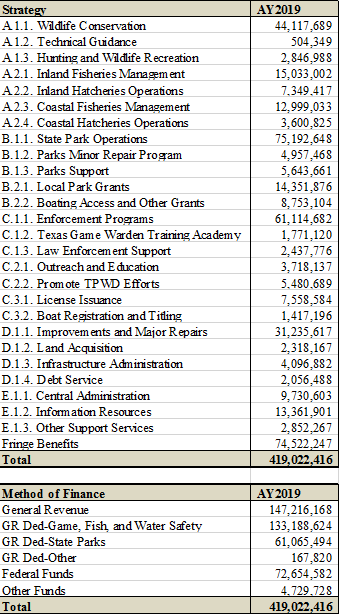
Work Session Item No. 2
Exhibit B
FY 2019 Operating and Capital Budget by Division/Object of Expense
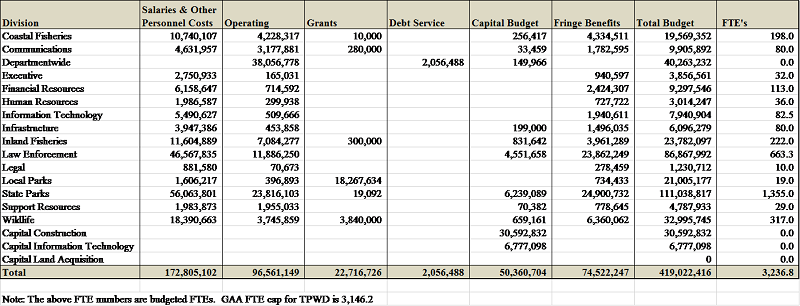
Work Session Item No. 2
Exhibit C
BUDGET POLICY (CP-009)
It is the policy of the Texas Parks and Wildlife Commission to authorize the Executive Director to approve and execute or have executed on his behalf, expenditures, budget adjustments and transfers as follows:
1. Adjust the budget to bring unexpended balances forward from prior year approved budgets.
2. Adjust the budget for transfers between budgetary units, major expense categories, or line items.
3. Adjust the budget to increase funds to allow payment of appraisal fees, witness fees, and investigation expenses on land acquisition and construction projects.
4. Approve and/or execute contracts and interagency agreements necessary in the daily operation of the Department. Revenues derived from interagency agreements may be budgeted and expended.
5. Adjust the budget for appropriated revenues, such as sale of equipment, donations, concessions, escrow, refunds, insurance proceeds, and publications revenue, so long as the expenditures are in agreement with the stated program goals and there will be sufficient cash during the fiscal year.
6. Approve and/or execute construction, repair, or renovation budgets, contracts, interagency agreements, and change orders if necessary to complete a project as approved by the Commission. Adjust the budget from one Department facility major repair or development project to another or from available revenue to cover increased project costs or changes in scope.
7. Allocate super combo license revenue to the related stamp funds according to the documented methodology and authorize the related transfers of revenue to appropriate accounts.
8. Adjust the budget to cover the costs of lawsuits or settlements if deemed to be in the best interest of Texas Parks and Wildlife.
9. Adjust the budget to place a Department facility into reasonable operation when its condition poses a health or safety hazard or seriously hampers its ability to function.
10. Authorize classification changes anytime during a budgetary year, providing that such changes have been thoroughly justified and funds are available.
11. Increase the number of positions when new facilities are placed into operation and/or new programs are implemented, staying within the authorized FTE limit.
12. Adjust the budget to make capital expenditures for construction projects funded in part with proceeds of bonds issued by the Texas Public Finance Authority.
13. Approve and/or execute the reimbursement of construction project costs with the proceeds of tax-exempt bonds issued by the Texas Public Finance Authority, pursuant to federal Internal Revenue Code guidelines.
14. The Chair or Vice Chair of the Commission, or a Commissioner designee of the Chair or Vice Chair, is authorized to increase, decrease or otherwise adjust the budget during the fiscal year based on revenue and expenditure information and document those actions as noted below. Any budget adjustments that exceed a threshold of $250,000, excluding federal and bond funds, require the prior approval of the Chair, Vice Chair, or Commissioner designee through such means as a conference call or memo. Donations or gifts exceeding $500 shall be accepted by the Chair, Vice Chair, or Commissioner designee on a monthly basis, with Commission acknowledgement of the acceptance of the donations at each scheduled Commission meeting. Subject to notification of the TPW Commission of any changes to previously discussed purposes or uses of funds, the Department is authorized to use dedicated accounts and sub-accounts for purposes consistent with those outlined in relevant statutory provisions or administrative rules as set forth in the Texas Administrative Code.
This policy shall rescind any existing policy on budget adjustments and transfers.
APPROVED this the 23rd day of August 2018.
In official recognition of the adoption of this resolution in a lawfully called public meeting of the Texas Parks and Wildlife Commission, we hereby affix our signatures this 23rd day of August 2018.
______________________________________
Ralph H. Duggins, Chairman
______________________________________
T. Dan Friedkin, Member
______________________________________
S. Reed Morian, Vice-Chairman
______________________________________
James H. Lee, Member
______________________________________
Anna B. Galo, Member
______________________________________
Dick Scott, Member
______________________________________
Bill Jones, Member
______________________________________
Kelcy L. Warren, Member
______________________________________
Jeanne W. Latimer, Member
Work Session Item No. 2
Exhibit D
INVESTMENT POLICY (CP-016)
All funds paid to Texas Parks and Wildlife Department (TPWD) pursuant to the Parks and Wildlife Code or allocated to TPWD per §151.801 of the Texas Tax Code are required by §11.042 of the Parks and Wildlife Code to be deposited in the treasury with two exceptions, the Operation Game Thief Fund and the Texas Park Development Fund. The Operation Game Thief Fund is held outside the treasury and, as authorized by Parks and Wildlife Code §12.201, is invested according to rules adopted by the Operation Game Thief Committee. Therefore, the investment of the Operation Game Thief Fund is not governed by this Investment Policy. Although not required, the Texas Park Development Fund is and will continue to be deposited in the treasury and invested by the Comptroller.
Parks and Wildlife Code §11.065 authorizes the commission to adopt rules for investment of the Lifetime License Endowment Account. The Lifetime License Endowment Account is and will continue to be deposited in the treasury and invested by the Comptroller.
In addition, TPWD has established an account at The Texas Treasury Safekeeping Trust Company, an organization created by the Texas Legislature to invest and safeguard funds for the state and various subdivisions whose sole shareholder and director is the Texas Comptroller of Public Accounts. TPWD’s account at The Texas Treasury Safekeeping Trust Company is for the purpose of accepting donations of marketable securities which shall be held only until accepted by the Commission. Donations of marketable securities shall be sold promptly upon acceptance by the Commission and the proceeds shall be deposited into the treasury.
I. Objectives of TPWD
- Suitability of the investment to TPWD requirements
- Preservation and safety of principal
- Liquidity
- Marketability
- Diversification of the portfolio
- Yield
II. Policy Guidelines
- TPWD funds shall be held in the state treasury and invested by the Comptroller under Texas Government Code §404.024.
- Mitigation funds distributed to TPWD shall be deposited in the state treasury and accounted for separately.
- Bank accounts authorized by the General Appropriations Act of the 85th Legislature, Article VI, Rider 3 , and Texas Government Code §403.241-403.252 and §660.025 (petty cash accounts and imprest accounts for the purchase of evidence) should be either interest-bearing accounts or accounts with no fees. Any interest earned in excess of bank fees shall be deposited in the General Revenue Fund. The establishment of any petty cash or imprest bank accounts must be approved by the Department’s Chief Financial Officer (Signature and Approval Policy OP-03-03). Continuance of bank accounts is dependent upon timely and accurate record keeping and reporting.
III. Texas Public Funds Investment Act: Investment Officer Designation and Reporting
- Pursuant to Texas Government Code §2256.004, the Texas Public Funds Investment Act (PFIA) does not apply to TPWD funds which are deposited into the state treasury and which are managed by the Texas Comptroller of Public Accounts in accordance with Texas Government Code §404.024. Therefore, TPWD does not presently have any funds on deposit outside the treasury subject to the PFIA.
- In the event that TPWD funds are deposited outside of the state treasury and become subject to the PFIA, the TPWD Executive Director, or designee, shall identify and designate an Investment Officer.
- The designated TPWD Investment Officer, or Officers, shall perform the functions and responsibilities required by the PFIA.
- The Investment Officer(s) shall attend investment training at least once each state fiscal biennium from a program recommended by the Texas Higher Education Coordinating Board.
- The Investment Officers are required to disclose any personal business or familial relationship with a business organization offering to sell investments to TPWD.
- The Investment Officers are required to provide a written copy of the investment policy to every business organization engaging in investment activity with TPWD and must obtain written acknowledgement that the policy was received and reviewed and appropriate procedures and controls are in place to preclude unauthorized transactions.
- The Investment Officers will ensure that all TPWD funds outside the state treasury held in bank accounts are insured by Federal Deposit Insurance Corporation (FDIC) up to the FDIC deposit insurance limit, currently $250,000. If at any time deposits exceed the FDIC deposit insurance limit in any financial institution, the custodian of the affected account(s) is required to obtain collateralization that meets state requirements to cover the amount exceeding the deposit insurance limit.
- Reports of investment transactions for all funds managed under the PFIA shall be prepared within 45 days of the end of each quarter and distributed to members of the Texas Parks and Wildlife Commission, the Executive Director and the Chief Financial Officer as required by § 2256.023. These quarterly reports shall comply with state requirements for content.
- To the extent that the Texas Legislature modifies any provision of the PFIA that is applicable to TPWD’s funds, a report summarizing those legislative changes to the PFIA shall be prepared and distributed to members of the Texas Parks and Wildlife Commission, the Executive Director and the Chief Financial Officer within six months of the end of a regular legislative session.
IV. Review - The Texas Parks and Wildlife Commission shall review this policy at least annually.
APPROVED this the 23rd day of August 2018.
In official recognition of the adoption of this resolution in a lawfully called public meeting of the Texas Parks and Wildlife Commission, we hereby affix our signatures this 23rd day of August 2018.
______________________________________
Ralph H. Duggins, Chairman
______________________________________
T. Dan Friedkin, Member
______________________________________
S. Reed Morian, Vice-Chairman
______________________________________
James H. Lee, Member
______________________________________
Anna B. Galo, Member
______________________________________
Dick Scott, Member
______________________________________
Bill Jones, Member
______________________________________
Kelcy L. Warren, Member
______________________________________
Jeanne W. Latimer, Member
Work Session Item No. 3
Presenter:
Cindy Hancock
Work Session
Fiscal Year 2018 Internal Audit Update and
Proposed Fiscal Year 2019 Internal Audit Plan
August 22, 2018
I. Executive Summary: Staff will present an update on the Texas Parks and Wildlife Department (TPWD) Fiscal Year (FY) 2018 Internal Audit Plan and ongoing or completed external audits, provide the methodology used to develop the proposed FY 2019 Internal Audit Plan, and recommend adoption of the motion to approve the proposed FY 2019 Internal Audit Plan.
II. Discussion:
-
a. Staff will provide an update on the TPWD FY 2018 Internal Audit Plan as well as a briefing of any external audits that have been recently completed and/or are ongoing.
b. Staff will discuss the methodology used in the development of the proposed FY 2019 Internal Audit Plan.
c. Staff will recommend adoption of the motion to approve the proposed FY 2019 Internal Audit Plan.
III. Recommendation: The staff recommends the Texas Parks and Wildlife Commission adopt the following motion:
"The Texas Parks and Wildlife Commission approves the TPWD FY 2019 Internal Audit Plan as listed in Exhibit A."
Work Session Item No. 3
Exhibit A
Proposed TPWD FY 2019 Internal Audit Plan
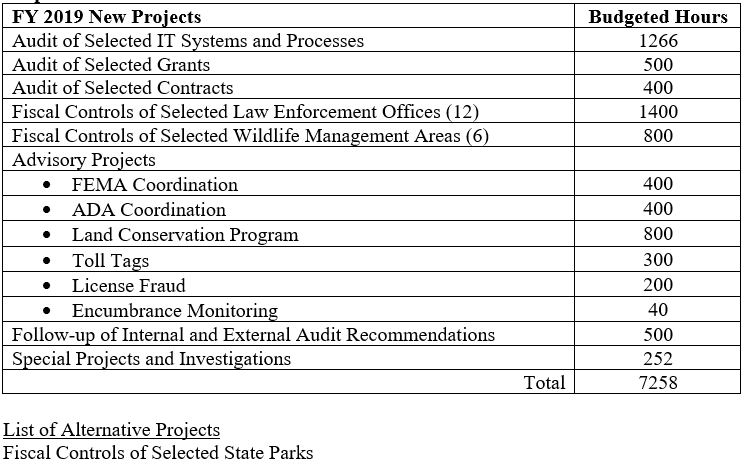
Work Session Item No. 7
Presenter:
Matt Reidy
Work Session
Raptor Proclamation Rules
Request Permission to Publish Proposed Changes in the Texas Register
August 22, 2018
I. Executive Summary: The staff seeks permission to publish proposed amendments to the Raptor Proclamation. The proposed amendments would:
- prohibit a general or master falconer from sponsoring more than three apprentice falconers at any given time;
- replace the specific web address of the federal reporting site with a general reference; and
- clarify provisions regarding the transfer of wild-caught raptors to falconers in other states.
II. Discussion: Under Texas Parks and Wildlife Code, Chapter 49, the Texas Parks and Wildlife Commission may prescribe rules for the taking, capture, possession, propagation, transportation, export, import, and sale of raptors, the times and areas from which raptors may be taken or captured, and species that may be taken or captured; provide standards for possessing and housing raptors held under a permit; prescribe annual reporting requirements and procedures; prescribe eligibility requirements and fees for and issue any falconry, raptor propagation, or nonresident trapping permit; and require and regulate the identification of raptors held by permit holders.
The practice of falconry is regulated at both the state and federal levels. The federal authority to regulate falconry is derived from the Migratory Bird Treaty Act, an international treaty to which the United States is a signatory. As with all migratory bird rules, the states may adopt rules that are more restrictive than the federal rules, but may not adopt rules that are less restrictive.
The proposed amendments are the result of recommendations by the Falconry and Raptor Council (an ad-hoc group of licensed falconers that assists Texas Parks and Wildlife Department in developing and improving falconry regulations) and are intended to improve oversight, streamline reporting, and facilitate compliance while discharging the agency’s statutory duty to protect the raptor resources of the state.
Work Session Item No. 7
Exhibit A
RAPTOR PROCLAMATION
PROPOSAL PREAMBLE
1. Introduction.
The Texas Parks and Wildlife Department proposes amendments to §§65.264, 65.269, 69.270, and 65.272, concerning the Raptor Proclamation.
The proposed amendment to §65.264, concerning Permit Application Requirements, would prohibit a general or master falconer from sponsoring more than three apprentice falconers at any given time. Teaching and learning the practice of falconry is an exacting and time-consuming process. A person cannot become a general or master falconer without first having completed a two-year apprenticeship under a general or master falconer, during which time the apprentice learns the rudiments of the sport of falconry, including the biology and care of raptors, the specialized equipment used in falconry, and the techniques of training raptors to hunt. Under current rules, there is no limit on the number of apprentices that may be sponsored at one time by a master or general falconer. The department’s Falconry and Raptor Council, an ad hoc group of licensed falconers created for the purpose of providing input to the department with respect to the regulation of falconry in the state, has recommended that in order to ensure that apprentice falconers are adequately trained, the rules should explicitly cap the number of apprentices that can be sponsored at any given time, and further recommended that the cap should be three. The department concurs with the recommendation.
The proposed amendments to §65.269, concerning Marking, Banding, and Telemetry, and §65.270, concerning Notification, Reporting, and Recordkeeping, would replace references to a specific URL with a general reference. The sport of falconry is regulated at both the federal and state levels. Federal rules require certain raptors possessed in captivity to be banded for identification purposes, and stipulates the electronic reporting of band numbers to the U.S. Fish and Wildlife Service (FWS) under various circumstances. The current rule identifies a specific URL to be used for that purpose; however, that URL is no longer functional, as it has been replaced by another. Rather than specify the URL by rule, the department believes it is prudent to refer generically to the database maintained by the FWS for the purposes of reporting band numbers.
The proposed amendment to §65.272, concerning Transfer, Sale, and Donation, would clarify rules regarding the transfer of wild-caught raptors to falconers in other states. The current rule stipulates that no person may transfer more than one wild-caught raptor to an out-of-state resident in any 12-month period, but confusion exists as to whether the provision applies in aggregate (i.e., to raptors in the possession of a falconer that were caught in different years) or only to the year in which a raptor was caught. The proposed amendment would specifically state that a wild-caught raptor could be transferred in the same year it was trapped, but limit such transfers to one per year.
2. Fiscal Note.
John Davis, Wildlife Diversity Program Director, has determined that for each of the first five years that the amendments as proposed are in effect, there will be no fiscal implications to state or local government as a result of enforcing or administering the rules.
3. Public Benefit/Cost Note.
Mr. Davis also has determined that for each of the first five years that the amendments as proposed are in effect:
(A) The public benefit anticipated as a result of enforcing or administering the proposed rules will be the regulation of falconry activities in Texas consistent with federal law and the provision of opportunity for citizens to trap, possess, and hunt with raptors.
There will be no adverse economic effect on persons required to comply with the rules as proposed.
(B) Under the provisions of Government Code, Chapter 2006, a state agency must prepare an economic impact statement and a regulatory flexibility analysis for a rule that may have an adverse economic effect on small businesses, micro-businesses, or rural communities. As required by Government Code, §2006.002(g), the Office of the Attorney General has prepared guidelines to assist state agencies in determining a proposed rule’s potential adverse economic impact on small businesses. Those guidelines state that an agency need only consider a proposed rule’s “direct adverse economic impacts” to small businesses and micro-businesses to determine if any further analysis is required. For that purpose, the department considers “direct economic impact “to mean a requirement that would directly impose recordkeeping or reporting requirements; impose taxes or fees; result in lost sales or profits; adversely affect market competition; or require the purchase or modification of equipment or services.
The department has determined that the rules will not affect small businesses, micro-businesses, or rural communities. Therefore, the department has not prepared the economic impact statement or regulatory flexibility analysis described in Government Code, Chapter 2006.
(C) The department has not drafted a local employment impact statement under the Administrative Procedures Act, §2001.022, as the agency has determined that the rules as proposed will not impact local economies.
(D) The department has determined that there will not be a taking of private real property, as defined by Government Code, Chapter 2007, as a result of the proposed rules.
(E) The department has determined that because the rules as proposed do not impose a cost on regulated persons, it is not necessary to repeal or amend any existing rule.
(F) In compliance with the requirements of Government Code, §2001.024, the department has prepared the following Government Growth Impact Statement (GGIS). The rule as proposed, if adopted, will:
(1) neither create nor eliminate a government program;
(2) not result in an increase or decrease in the number of full-time equivalent employee needs;
(3) not result in a need for additional General Revenue funding;
(4) not affect the amount of any fee;
(5) not create a new regulation;
(6) not expand, limit, or repeal an existing regulation;
(7) neither increase nor decrease the number of individuals subject to regulation; and
(8) not positively or adversely affect the state’s economy.
4. Request for Public Comment.
Comments on the proposal may be submitted to Megan Nelson at (512) 389-4434, email: megan.nelson@tpwd.texas.gov. Comments also may be submitted via the department’s website at https://www.tpwd.texas.gov/business/feedback/public_comment/.
5. Statutory Authority.
The amendments are proposed under Parks and Wildlife Code, Chapter 49, which authorizes the commission to prescribe rules for the taking, capture, possession, propagation, transportation, export, import, and sale of raptors, time and area from which raptors may be taken or captured, and species that may be taken or captured; provide standards for possessing and housing raptors held under a permit; prescribe annual reporting requirements and procedures; prescribe eligibility requirements and fees for and issue any falconry, raptor propagation, or nonresident trapping permit; and require and regulate the identification of raptors held by permit holders.
The proposed amendments affect Parks and Wildlife Code, Chapter 49.
6. Rule Text.
§65.264. Permit Application Requirements.
(a) (No change.)
(b) Educational or school programs may not be used to satisfy the experience requirements of paragraphs (1) — (4) of this subsection.
(1) – (3) (No change.)
(4) A general or master falconer may not sponsor more than three apprentices at any time, which the department will determine based on the active sponsorship agreements required by paragraph (1)(B)(i) of this subsection that are on file with the department.
(5)[(4)] An applicant for a raptor propagator permit must:
(A) be a resident of Texas;
(B) be 18 years of age or older;
(C) have at least five years of experience in the practice of falconry; and
(D) possess a valid general or master permit.
(6)[(5)] An applicant for a nonresident trapping permit must possess a license, issued by their state of residence, equivalent to a Texas falconry permit.
(c) – (g) (No change.)
§65.269. Marking, Banding, and Telemetry.
(a) Markers and bands.
(1) (No change.)
(2) A person who takes a goshawk, Harris’s hawk, peregrine falcon, or gyrfalcon from the wild or acquires one from a rehabilitator must band the raptor with a Type 1 leg band. Within ten days from the date of take, the person shall report the take of the bird by entering the required information (including the band number) in the electronic database maintained by the FWS for that purpose [at http://permits.fws.gov/186A]. Upon request, the department will supply a band in advance of capture.
(3) A person who possesses a raptor bred in captivity must band the bird with a Type 2 leg band. If the band required by this subsection is removed or lost, it must be reported within ten days of removal or loss by contacting the department. The department shall issue a replacement band upon notification. The person shall band the bird with the replacement band immediately upon receipt of the band and immediately upon rebanding shall submit all required information electronically to the database maintained by the FWS for that purpose [at http://permits.fws.gov/186A].
(4) If a band is removed or lost from a raptor that is not captive-bred, the person in whose name the raptor is possessed must report the removal or loss within five days and request a replacement band from the department. The person shall band the bird with the replacement band immediately upon receipt and shall submit the required information electronically immediately upon rebanding to the database maintained by the FWS for that purpose [at http://permits.fws.gov/186A].
(5) – (7) (No change.)
(b) (No change.)
§65.270. Notification, Reporting, and Recordkeeping.
(a) (No change.)
(b) A permittee shall maintain a copy of all notifications required under this section for a period of five years. Notification under this subsection shall be made via the electronic database maintained by the FWS for that purpose[at http://permits.fws.gov/186A]. Except as specifically provided by paragraph (6) of this subsection, notification shall be within ten days of any event condition listed in this subsection. A permittee is required to provide notification:
(1) – (7) (No change.)
(c) – (f) (No change.)
§65.272. Transfer, Sale, and Donation.
(a) – (b) (No change.)
(c) A lawfully caught wild raptor may be transferred to a qualified out-of-state resident in the same year that it was trapped; however, no person may make more than one such transfer per permit year. [No person may transfer more than one wild-caught raptor to an out-of-state resident in any 12-month period.]
(d) – (h) (No change.)
This agency hereby certifies that the proposal has been reviewed by legal counsel and found to be within the agency’s authority to adopt.
Issued in Austin, Texas, on
Work Session Item No. 8
Presenter:
Craig Bonds
Work Session
Shad Rules
Request Permission to Publish Proposed Changes in the Texas Register
August 22, 2018
I. Executive Summary: The staff seeks permission to publish proposed amendments to rules governing the collection, possession, and sale of shad. The proposed rules would:
- modify the titles of both the rule and the subchapter containing the rule;
- increase the value for the container size that triggers the permit requirement; and
- clarify rule language governing exceptions to the permit requirement.
II. Discussion: Under Texas Parks and Wildlife Code §67.0041, Texas Parks and Wildlife Department may issue permits for the taking, possession, propagation, transportation, sale, importation, or export of a nongame species of fish if necessary to properly manage that species. Gizzard and threadfin shad are nongame species.
In March 2017, the Texas Parks and Wildlife Commission adopted new rules for possession and sale of gizzard and threadfin shad collected from public fresh water. The rules require persons to obtain a permit if shad are collected for personal use (as bait or for stocking in private ponds) in containers constituting an aggregate volume of 82 quarts or more.
As a result of a petition for rulemaking, the staff proposes to increase aggregate container volume from 82 quarts to 30 gallons. An increase in container size to 30 gallons will allow recreational anglers to use larger containers, which will be particularly beneficial when using gizzard shad as bait and will have minimal biological impact on shad populations.
Work Session Item No. 8
Exhibit A
PERMITS TO COLLECT OR SELL
NONGAME FISH TAKEN FROM PUBLIC WATER
PROPOSAL PREAMBLE
1. Introduction.
The Texas Parks and Wildlife Department proposes an amendment to §57.385, concerning Permits to Collect or Sell Nongame Fish Taken from Public Water. The proposed amendment would increase the volumetric threshold value beyond which persons possessing or transporting shad must obtain a permit and clarify that the exceptions provided for the permit requirement apply only on the waterbody where the shad were collected.
Under current rule (§57.385(b)), the collection of shad from public fresh water without a permit is prohibited if the shad are possessed in container(s) exceeding 82 quarts in volume, with exceptions. The proposed amendment would increase the minimum volume from 82 quarts to 30 gallons and clarify that the possession and transport of shad from the waterbody where collected is prohibited unless a permit has been obtained.
The current threshold value of 82 quarts was selected because the department determined that such a volume represented a biologically insignificant impact to the resource. As a result of further evaluation, the department believes that increasing that value to 30 gallons will not result in negative population impacts.
The proposed amendment also would retitle the section and the subchapter to more accurately reflect the activities governed by the rules. The new title of Chapter 57, Subchapter E, would become “Permits to Possess or Sell Nongame Fish Taken from Public Fresh Water,” and the new title for §57.385 would become “Special Provisions for the Collection, Possession, and Sale of Shad.”
2. Fiscal Note.
Ken Kurzawski, Regulations and Information Programs Director, Inland Fisheries Division, has determined that for each of the first five years that the rule as proposed is in effect, there will be fiscal implications to state government as a result of enforcing or administering the rule. The department estimates that fewer than 10 persons currently required to obtain the $60 permit would no longer be required to obtain the permit, resulting in annual revenue loss to the department of $600 or less.
3. Public Benefit/Cost Note.
Mr. Kurzawski also has determined that for each of the first five years the rule as proposed is in effect:
(A) The public benefit anticipated as a result of enforcing or administering the rule as proposed will be the management and protection of nongame fisheries resources.
(B) There will be no economic impact on persons required to comply with the rule.
(C) Under the provisions of Government Code, Chapter 2006, a state agency must prepare an economic impact statement and a regulatory flexibility analysis for a rule that may have an adverse economic effect on small businesses and micro-businesses. As required by Government Code, §2006.002(g), the Office of the Attorney General has prepared guidelines to assist state agencies in determining a proposed rule’s potential adverse economic impact on small businesses. Those guidelines state that an agency need only consider a proposed rule’s “direct adverse economic impacts” to small businesses and micro-businesses to determine if any further analysis is required. For that purpose, the department considers “direct economic impact” to mean a requirement that would directly impose recordkeeping or reporting requirements; impose taxes or fees; result in lost sales or profits; adversely affect market competition; or require the purchase or modification of equipment or services.
The department has determined that the rules will not affect small businesses, micro-businesses, or rural communities, since the proposed rule will relax the current threshold for permit possession and therefore subject fewer small businesses and micro-businesses to permit requirements. The department has determined that because of the very small number of persons engaged in commercial activities involving shad, the very small volume of shad being subjected to commercial exploitation, and the abundance of shad resources, the proposed rule will not affect rural communities. Therefore, the department has not prepared the economic impact statement or regulatory flexibility analysis described in Government Code, Chapter 2006.
(D) The department has not drafted a local employment impact statement under the Administrative Procedures Act, §2001.022, as the agency has determined that the rules as proposed will not impact local economies.
(E) The department has determined that Government Code, §2001.0225 (Regulatory Analysis of Major Environmental Rules), does not apply to the proposed amendment.
(F) The department has determined that there will not be a taking of private real property, as defined by Government Code, Chapter 2007, as a result of the proposed amendment.
(G) The department has determined that because the rules as proposed do not impose a cost on regulated persons, it is not necessary to repeal or amend any existing rule.
(H) In compliance with the requirements of Government Code, §2001.024, the department has prepared the following Government Growth Impact Statement (GGIS). The rule as proposed, if adopted, will:
(1) neither create nor eliminate a government program;
(2) not result in an increase or decrease in the number of full-time equivalent employee needs;
(3) not result in a need for additional General Revenue funding;
(4) not affect the amount of any fee;
(5) not create a new regulation;
(6) liberalize an existing regulation (by increasing the minimum aggregate volume of shad that may be possessed without a permit);
(7) decrease the number of individuals subject to regulation; and
(8) not positively or adversely affect the state’s economy.
4. Request for Public Comment.
Comments on the proposed rule may be submitted to Ken Kurzawski, Texas Parks and Wildlife Department, 4200 Smith School Road, Austin, Texas, 78744; (512) 389-4591 (email: ken.kurzawski@tpwd.texas.gov) or via the department website at https://tpwd.texas.gov/business/feedback/public_comment/.
5. Statutory Authority.
The amendment is proposed under Parks and Wildlife Code, Chapter 67, which gives the commission the authority to establish any limitations on the take, possession, propagation, transportation, importation, exportation, sale, and offering for sale of nongame fish and wildlife necessary to manage those species.
The proposed amendment affects Parks and Wildlife Code, Chapter 67.
6. Rule Text.
§57.385. Special Provisions for the Collection, Possession, and Sale of [–] Shad.
(a) No person may sell, offer for sale, possess for purposes of sale, or exchange for anything of value shad taken from public fresh water unless the person possesses:
(1) a valid permit issued by the department under this subchapter specifically authorizing that activity; or
(2) a valid fishing guide license issued by the department and the shad are being provided to persons engaged in fishing as part of the guide’s services.
(b) No person may collect and possess shad taken from public fresh water without a permit issued under this section unless the person possesses a valid recreational fishing license issued by the department and the shad are:
(1) [are] not sold or exchanged for anything of value; and
(2) [are] possessed in a container or containers that in the aggregate constitute 30 gallons or less in volume. The volume limit does not apply when shad are possessed:
[(A) in a container or containers that in the aggregate constitute 82 quarts or less in volume;]
(A)[B] on the waterbody from which the shad were taken [and are used as bait]; or
(B)[C] by a licensed fishing guide [to be provided to persons engaged in fishing as part of the guide’s services regardless of the container volume].
This agency hereby certifies that the proposal has been reviewed by legal counsel and found to be within the agency’s authority to adopt.
Issued in Austin, Texas, on
Work Session Item No. 10
Presenter:
Dr. Pamela Wheeler
Work Session
Employee Training Rules
Request Permission to Publish Proposed Changes in the Texas Register
August 22, 2018
I. Executive Summary: The staff seeks permission to publish a proposed amendment to employee training rules in the Texas Register for public comment. The proposed amendment would require prior executive director approval for training and education program tuition reimbursement to Texas Parks and Wildlife Department (TPWD) employees.
II. Discussion: Texas Government Code Chapter 656 provides that state agencies may reimburse employees for certain training and education program expenses, including tuition. Government Code Section 656.048 requires state agencies to adopt rules requiring that the executive head of the agency authorize a tuition reimbursement payment before the reimbursement is paid to an employee. By agency policy, TPWD currently requires executive director approval of the payment of tuition reimbursement. The proposed amendment would formalize by rule this requirement.
Work Session Item No. 10
Exhibit A
EMPLOYEE TRAINING RULES
PROPOSAL PREAMBLE
1. Introduction.
The Texas Parks and Wildlife Department proposes an amendment to §51.500, concerning Employee Training. Under the provisions of Government Code, §656.047, a state agency may spend public funds as appropriate to pay the salary, tuition and other fees, travel and living expenses, training stipend, expense of training materials, and other necessary expenses of an instructor, student, or other participant in a training or education program. Government Code, §656.048, requires a state agency to adopt rules to require the executive head of the agency to authorize the tuition reimbursement payment before an employee of the agency may be reimbursed. TPWD policy currently requires executive director approval of tuition reimbursement. The proposed amendment would require by rule the approval by the department’s executive director before payment of reimbursement to an employee or administrator for tuition under the provisions of Government Code, §656.047.
2. Fiscal Note.
Scott Stover, Director of the Support Resources Division, has determined that there will be no fiscal implications to state or local government as a result of administering the amendment.
3. Public Benefit/Cost Note.
Mr. Stover also has determined that each of the first five years the amendment as proposed is in effect:
(A) The public benefit anticipated as a result of enforcing or administering the amendment as proposed will be rules that comply with the direction of the Texas Legislature.
There will not be any adverse economic effect on persons required to comply with the amendment as proposed.
(B) Under the provisions of Government Code, Chapter 2006, a state agency must prepare an economic impact statement and a regulatory flexibility analysis for a rule or amendment that may have an adverse economic effect on small businesses, micro-businesses, or rural communities. As required by Government Code, §2006.002(g), in April 2008, the Office of the Attorney General issued guidelines to assist state agencies in determining a proposed rule or amendment’s potential adverse economic impact on small businesses. These guidelines state that “generally, there is no need to examine the indirect effects of a proposed rule or amendment on entities outside of an agency’s regulatory jurisdiction.” The guidelines state that an agency need only consider a proposed rule or amendment’s “direct adverse economic impacts” to small businesses and micro-businesses to determine if any further analysis is required. The guidelines also list examples of the types of costs that may result in a “direct economic impact.” Such costs may include costs associated with additional recordkeeping or reporting requirements; new taxes or fees; lost sales or profits; changes in market competition; or the need to purchase or modify equipment or services.
The department has determined that the amendment as proposed will not affect small businesses, micro-businesses, or rural communities. Therefore, the department has not prepared the economic impact statement or regulatory flexibility analysis described in Government Code, Chapter 2006.
(C) The department has not drafted a local employment impact statement under the Administrative Procedures Act, §2001.022, as the agency has determined that the amendment as proposed will not impact local economies.
(D) The department has determined that Government Code, §2001.0225 (Regulatory Analysis of Major Environmental Rules), does not apply to the proposed amendment.
(E) The department has determined that there will not be a taking of private real property, as defined by Government Code, Chapter 2007, as a result of the proposed amendment.
(F) The department has determined that because the amendment as proposed does not impose a cost on regulated persons, it is not necessary to repeal or amend any existing rule.
(G) In compliance with the requirements of Government Code, §2001.0221, the department has prepared the following Government Growth Impact Statement (GGIS). The amendment as proposed, if adopted, will:
(1) not eliminate a government program;
(2) not result in an increase or decrease in the number of full-time equivalent employee needs;
(3) not result in a need for additional General Revenue funding;
(4) create a new regulation (to provide for the approval of tuition reimbursement by the executive director);
(5) neither increase nor decrease the number of individuals subject to regulation through time;
(6) not expand, limit, or repeal an existing regulation; and
(7) not significantly affect the state’s economy positively or adversely.
4. Request for Public Comment.
Comments on the proposed rule may be submitted to Scott Stover, Texas Parks and Wildlife Department, 4200 Smith School Road, Austin, Texas 78744; (512) 389-4849 (email: scott.stover@tpwd.texas.gov) or via the department’s website at https://tpwd.texas.gov/business/feedback/public_comment/.
5. Statutory Authority.
The amendment is proposed under authority of Government Code, §656.048 which requires the commission to adopt rules requiring that before an administrator or employee of the agency may be reimbursed under Section 656.047(b), the executive head of the agency must authorize the tuition reimbursement payment et fees to be charged for replacement licenses.
The proposed amendment affects Government Code, Chapter 656.
6. Rule Text.
§51.500. Employee Training.
(a) –(j) (No change.)
(k) A reimbursement to an employee or administrator for tuition under the provisions of Government Code, §656.047 must be approved by the executive director before the reimbursement is paid.
This agency hereby certifies that the proposal has been reviewed by legal counsel and found to be within the agency’s authority to adopt.
Issued in Austin, Texas.
Work Session Item No. 15
Presenter:
Trey Vick
Work Session
Exchange of Land – Bexar County
Approximately 56 Acres at the Government Canyon State Natural Area
Permission to Begin the Public Notice and Input Process
August 22, 2018
I. Executive Summary: The Texas Parks and Wildlife Department (TPWD) staff has been working with an adjacent private landowner on a proposal to exchange a 56-acre tract of land for a 56-acre tract of land that has greater conservation and recreation value for the Government Canyon State Natural Area (SNA).
II. Discussion: The 12,116-acre Government Canyon SNA includes 3,021 acres acquired by the City of San Antonio (COSA) to protect recharge of the Edwards Aquifer, and transferred to TPWD in 2014 for addition to the SNA. The 3,021-acre transfer consisted of approximately 20 tracts, including a tract in the southern extremity of the SNA that is low-quality habitat mesquite field. This tract is not over the Edwards Aquifer recharge zone and is adjacent to a residential neighborhood its entire length. The neighbor opposite the subdivision owns land that sits over the recharge zone and has high habitat values adjacent to the main body of the SNA. This neighbor proposes to exchange 56 acres of his property for 56 acres of TPWD’s mesquite field. Staff of the SNA believe this exchange will increase the net conservation and recreation values of the SNA. The staff of the SNA has coordinated with COSA, U.S. Fish and Wildlife Service and the Department of Defense (regarding golden-cheeked warbler recovery) to ensure all parties concur with the proposed exchange.
The staff requests permission to begin the public notice and input process.
Work Session Item No. 15
Exhibit A
Location Map for Government Canyon State Natural Area in Bexar County
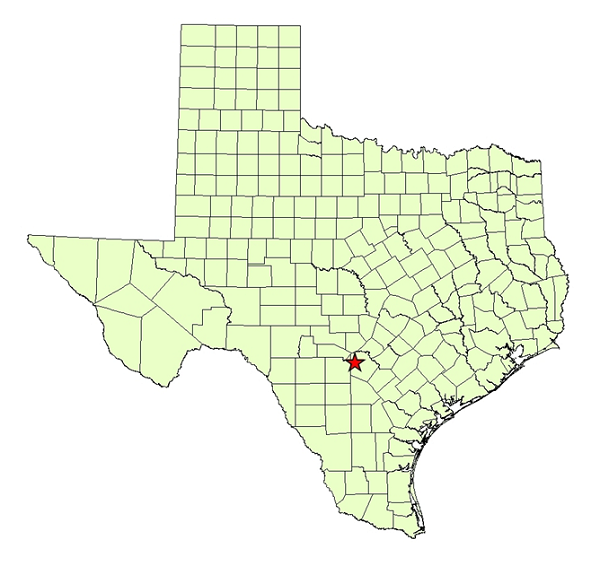
Work Session Item No. 15
Exhibit B
Vicinity Map for Government Canyon State Natural Area (SNA) in Northwest San Antonio
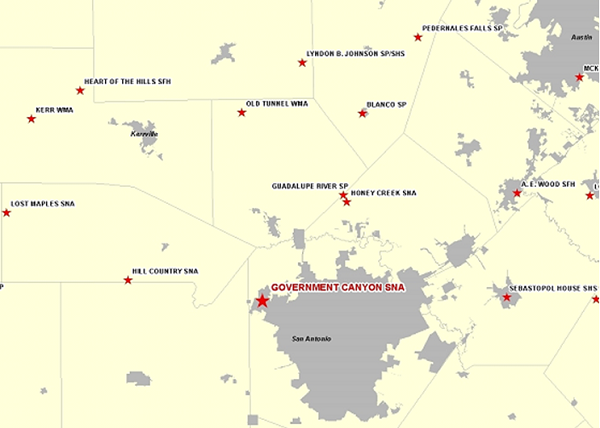
Work Session Item No. 15
Exhibit C
Map Showing Location of Detail for Site Map of Subject Tracts
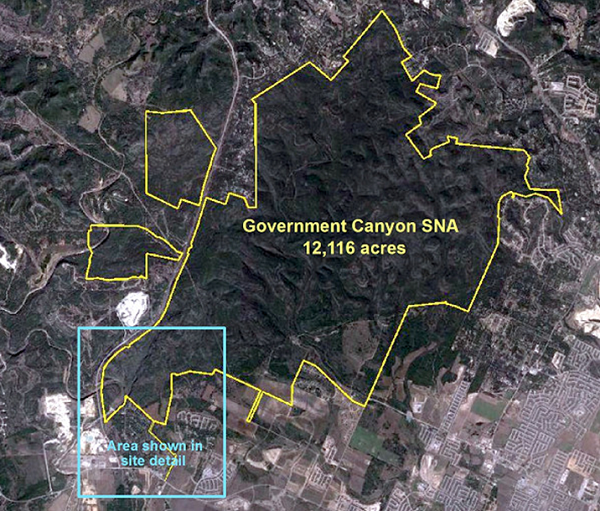
Work Session Item No. 15
Exhibit D
Site Map of Subject Exchange Tracts, Outlined in Yellow
Park Boundary Outlined in Red
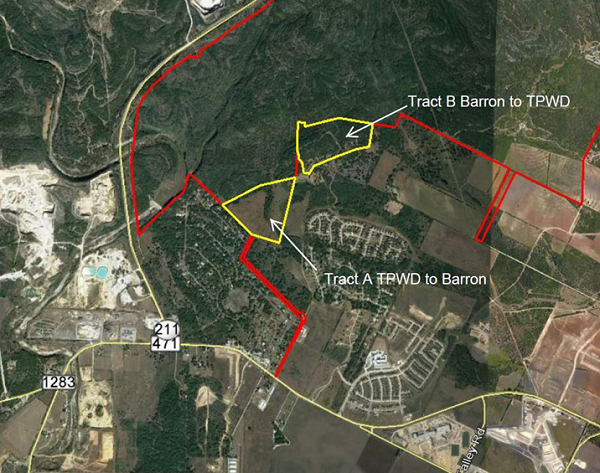
Work Session Item No. 17
Presenter:
Bob Sweeney
Ted Hollingsworth
(Executive Session and Work Session)
Exchange of Real Estate – Jefferson County
Approximately 120 Acres at the J.D. Murphree Wildlife Management Area
Permission to Begin the Public Notice and Input Process
August 22, 2018
I. Executive Summary: Round Lake is a portion of the J.D. Murphree Wildlife Management Area (WMA) in Jefferson County near Port Arthur which is connected by canal to the rest of the WMA. Port Arthur LNG, LLC (PALNG) (a subsidiary or affiliate of Sempra LNG) owns property that nearly surrounds Round Lake and intends to build and operate a new liquefied natural gas (LNG) export facility on this property. To eliminate the Round Lake inholding, PALNG has approached Texas Parks and Wildlife Department (TPWD) about exchanging the Round Lake property for other property in the area.
II. Discussion: The 24,498-acre J.D. Murphree WMA preserves a mosaic of tidal, intermediate, and freshwater wetlands including bayous, ponds, lakes, emergent marshes, salt meadows, and coastal prairie. The WMA is managed for its diversity of native wetland habitats and associated species such as alligators and waterfowl. The location of the WMA within Texas is shown on Exhibit A.
Round Lake is a brackish, shallow (approximately 4 feet deep at its deepest), roughly circular impoundment of approximately 120 acres on the eastern edge of the WMA. The location of Round Lake within the WMA is shown on Exhibit B. The lake supports an assemblage of plants and animals typical for this habitat: banana water lily (Nymphaea Mexicana); coontail (Ceratophyllum demersum); widgeon grass (Ruppia maritima); canvasback (Aythya valisineria), blue-winged teal (Anas discors); other waterfowl and wading birds; and a robust population of American alligators (Alligator mississippiensis). TPWD has water-only access to Round Lake and public use has been limited to youth alligator hunts in recent years.
PALNG proposes to exchange a significantly larger area of quality coastal wetland habitat for Round Lake. This exchange would eliminate a TPWD inholding that is almost completely surrounded by PALNG property earmarked for industrial development. Staff recommends that the Texas Parks and Wildlife Commission consider exchanging Round Lake for a larger property that would provide superior habitat and public use values. Staff requests permission to begin the public notice and comment process in the event a suitable exchange can be agreed upon with PALNG.
Work Session Item No. 17
Exhibit A
Location Map for J.D. Murphree Wildlife Management Area in Jefferson County
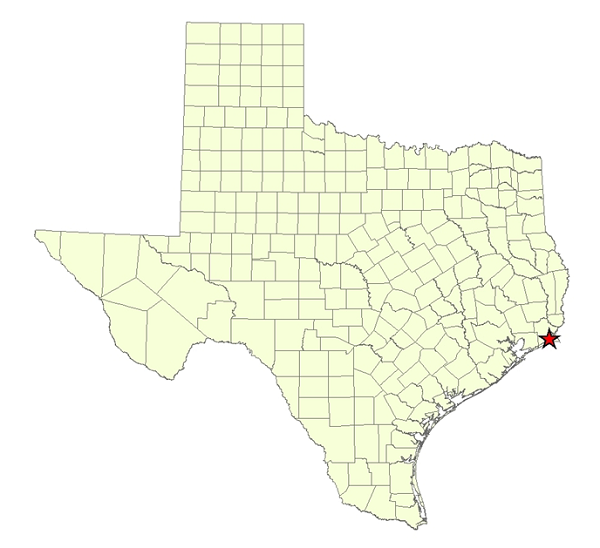
Work Session Item No. 17
Exhibit B
Site Map for J.D. Murphree Wildlife Management Area (WMA) in Jefferson County
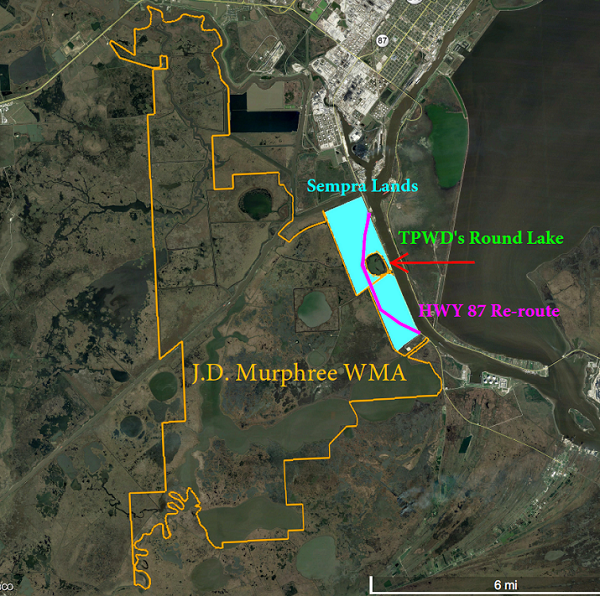
Work Session Item No. 18
Presenter:
Bob Sweeney
(Executive Session Only)
Litigation Update
August 22, 2018
I. Executive Summary: Attorneys for the Texas Parks and Wildlife Department (TPWD) will update and advise the Texas Parks and Wildlife Commission regarding pending or anticipated litigation, including but not limited to the following pending lawsuits:
- Potential or pending litigation related to oysters, including but not limited to State of Texas v. Chambers-Liberty Counties Navigation District, Each in his Official Capacity: Terry Haltom as CLCND Commissioner, Allen Herrington as CLCND Commissioner, Kenn Coleman as CLCND Commissioner, Ken Mitchell as CLCND Commissioner, and Dave Wilcox as CLCND Commissioner, and Sustainable Texas Oyster Resources Management, LLC., Cause No. D-1-GN-15-003093, in Travis County District Court.
- Potential or pending litigation regarding disease in white-tailed deer, including but not limited to Ken Bailey and Bradly Peterson v. Carter Smith, Executive Director, Clayton Wolf, Wildlife Division Director, Mitch Lockwood, Big Game Program Director and Texas Parks and Wildlife Department, Cause No. D-1-GN-15-004391, in Travis County District Court; and Labelleco Whitetail Ranch, Inc., and Ryan Merendino v. Carter Smith, Executive Director, Mitch Lockwood, Big Game Program Director and Texas Parks and Wildlife Department, Cause No. D-1-GN-18-001480, in Travis County District Court.
Work Session Item No. 19
Presenter:
Bob Sweeney
Brent Leisure
(Executive Session Only)
Sunset Commission Recommended Transfer of Eight State Historic Sites from the Texas
Parks and Wildlife Department to the Texas Historical Commission
August 22, 2018
I. Executive Summary: The Texas Historical Commission (THC) is undergoing its sunset review by the Sunset Advisory Commission (Sunset Commission). The Sunset Commission’s June 2018 report regarding THC recommended, among other things, that the Texas Parks and Wildlife Department (TPWD) transfer to THC “eight remaining historic sites…that are not attached to a state park.”
II. Discussion: The eight sites recommended in the report for transfer to THC are:
- Battleship Texas
- Fanthorp Inn
- Fort Leaton
- Lipantitlan
- Monument Hill/Kreische Brewery
- Port Isabel Lighthouse
- San Jacinto Monument and Battleground
- Washington-on-the-Brazos
The locations of these sites within Texas are shown on Exhibit A. With the exception of Battleship Texas, these sites include real estate ownership by TPWD.
The Texas Legislature transferred TPWD historic sites to THC in 2005 (the National Museum of the Pacific War in Fredericksburg by House Bill 2025, 79th Legislative Session) and in 2007 (eighteen sites by House Bill 12, 80th Legislative Session). In addition, Texas Government Code Section 442.075 (enacted as part of House Bill 2025 in 2005) governs transfer of historic sites from TPWD to THC by interagency agreement.
The Texas Parks and Wildlife Code and agency policy address land transfers. Texas Parks and Wildlife Code Section 13.008 authorizes TPWD to transfer land to another state department or institution “if ownership of the site is no longer in the best interest” of TPWD. A two-thirds vote of the Commission is necessary for action taken under Section 13.008. Under agency policy, normally real estate dispositions are considered in two separate Commission meetings. When, however, the proposed transfer of land is mandated by legislation that does not require further Commission action, the transfer may proceed without additional Commission approval.
Work Session Item No. 19
Exhibit A
Location Map for Sunset Commission Proposed Site Transfer
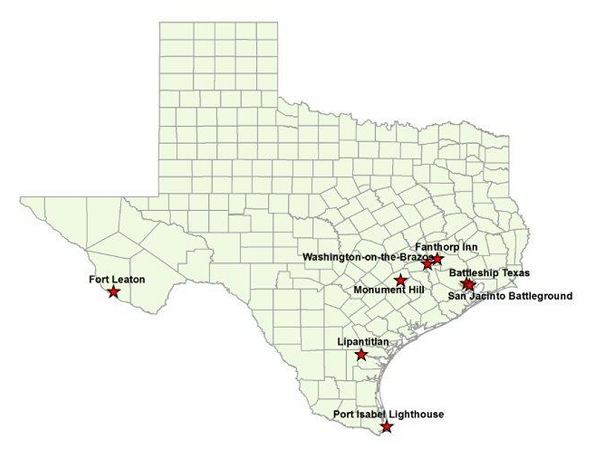
Work Session Item No. 20
Presenter:
Chairman Ralph Duggins
(Executive Session Only)
Personnel Matters
Performance Evaluation of the Texas Parks and Wildlife Department Executive Director
August 22, 2018
I. Executive Summary:
- Annual Performance Evaluation of the Texas Parks and Wildlife Department Executive Director